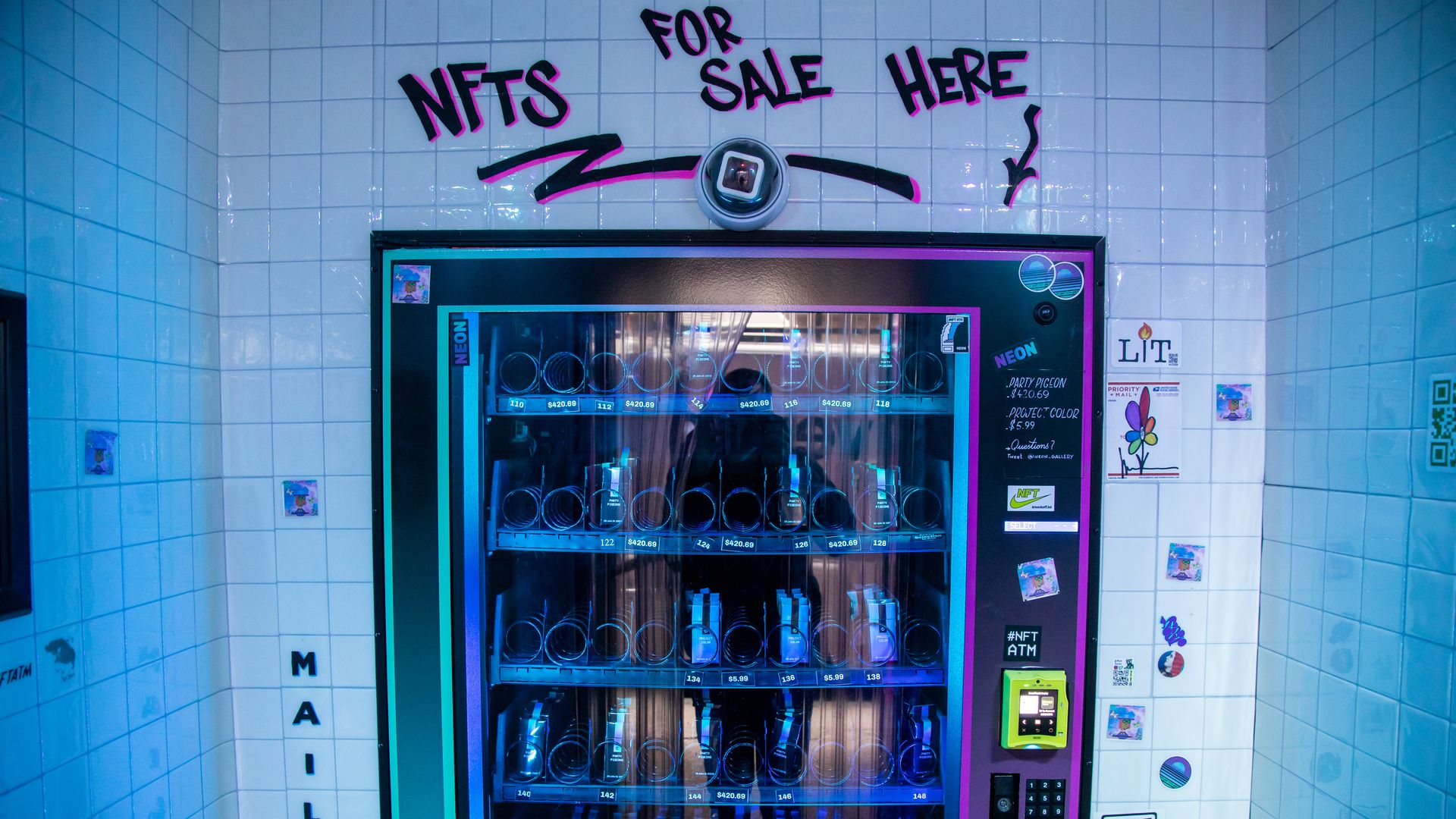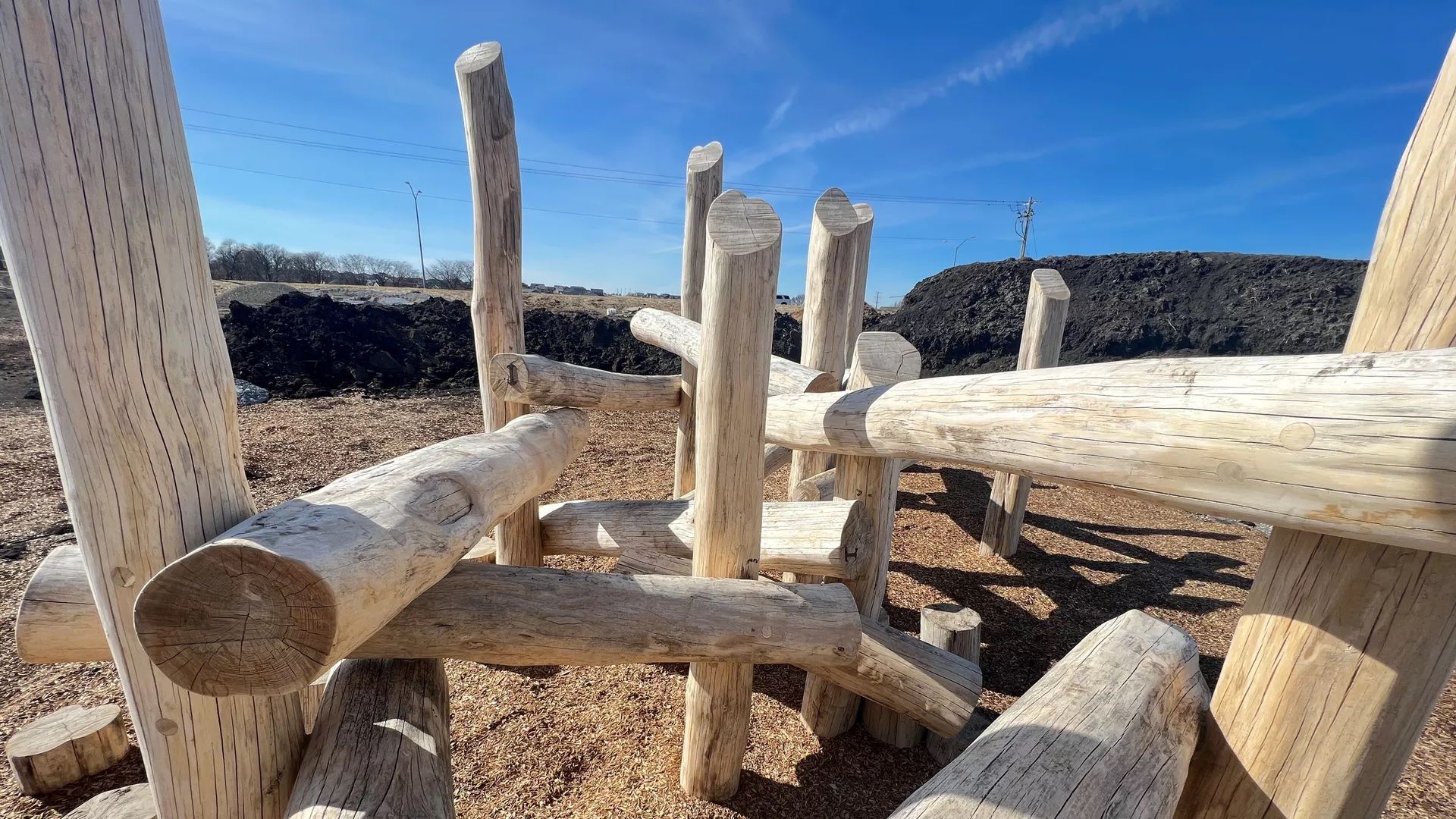| | | | | | | Presented By General Motors | | | | Axios What's Next | | By Jennifer A. Kingson and Joann Muller · Apr 13, 2022 | | For the first time in a while, Joann is back at the New York International Auto Show this week — it had been on hiatus because of COVID-19. - What would you like to hear about from the show? What excites you most about the car of the future? Email us at whatsnext@axios.com.
Today's Smart Brevity count: 1,165 words ... 4½ minutes. | | | | | | 1 big thing: New York's NFT vending machine |  | | | The Neon NFT vending machine at 29 John St. in Manhattan's Financial District. Photo: Michael Nagle/Bloomberg via Getty Images | | | | Vending machines dispense all sorts of offbeat things these days — like hamburgers and pizza — and now it's time to add non-fungible tokens to the list, Jennifer A. Kingson writes. Why it matters: While most people would be hard-pressed to define what an NFT is, the tokens were all the rage at SXSW this year, and their arrival in an ATM in New York City's Financial District may mean NFT-dispensing machines could grow as ubiquitous as cryptocurrency ATMs. What they are: NFTs are "unique digital assets — often works of art, game characters and other creative products — that are recorded on a blockchain, or persistent digital ledger," writes Axios tech editor Peter Allen Clark. How it works: The ATM at 29 John St. in lower Manhattan was put there by Neon, which calls itself "a marketplace and gallery built on the Solana blockchain." Neon sells unique digital pieces of art, in familiar forms like Baby Yoda. - "The NFT ATM works very similarly to traditional ATMs," according to Cointelegraph. "You can purchase NFTs through the machine with your credit or debit card, and it will dispense boxes that contain unique codes that you can redeem through Neon's platform."
- "Much like Easter egg capsules, buyers will not know what NFT they're getting until they redeem it."
- Prices range from $5.99 to $420.69 (a tongue-in-cheek number derived from 420 — a marijuana reference — and a sex joke).
- Once a QR code inside the box is scanned, "the user can see their new piece of art on any smartphone, laptop or tablet," Reuters says.
What's next: Neon plans to add more artists to its platform and open more NFT ATMs in different cities, Jordan Birnholtz, co-founder and chief marketing officer of Neon, tells Cointelegraph. A tweet from a satisfied customer. Screenshot: @DRIFTER1117/TwitterShare this story. |     | | | | | | 2. Pedestrian fatalities rose post-pandemic lockdown |  As lockdowns eased in the second year of the pandemic, the number of people struck and killed by drivers rose in many states, according to a new report by the Governors Highway Safety Association, write Jennifer and Thomas Wheatley of Axios Atlanta. Driving the news: Pedestrian fatalities increased in all but 11 states during the first six months of 2021 compared with the same period of 2020, with 3,441 people killed while they walked near roadways. - Fatalities were up 17% for the first half of 2021 compared with 2020, the report said.
Why it matters: The Governors Highway Safety Association (GHSA) says that its "Safe System" approach to traffic safety could make a big dent in the problem. - The approach — which helped reduce road deaths in Australia by 47% and in Spain by 80% — envisions "creating a transportation system that accommodates human mistakes and keeps impacts on the human body at survivable levels," the GHSA says.
Details: Thirty-nine states and the District of Columbia had increases in pedestrian fatalities during the period studied, while only 11 states had decreases. - The states with the biggest increase in the number of pedestrian deaths were Florida, South Carolina, Georgia, Texas and New York.
- The states with the biggest increase in the percentage of pedestrian deaths were Vermont, Maine, Wyoming, South Carolina and Massachusetts. (Because states vary widely in population, just a small shift in fatality numbers can represent a large change in percentages.)
- Connecticut saw the largest drop in number (-11) followed by North Carolina (-10) and Kansas and Missouri (-8).
- Nebraska saw the largest percentage drop (-67%), followed by Connecticut (-39%) and New Hampshire (-38%).
Read the full story. |     | | | | | | 3. California's driest start to the year |  Reproduced from NOAA; Chart: Axios Visuals California is entering the dry season with its water resources in a precarious position, having seen its driest start to the year on record, writes Andrew Freedman of Axios Generate. - A heat wave last week sent temperatures soaring into the 90s and even triple digits in some locations, as the paltry Sierra Nevada snowpack shrank even further.
Why it matters: Water and wildfire woes lie ahead for the nation's most populous state, as spring runoff into reservoirs slows to a trickle and forests dry out unusually early in the year. Context: While some mountain snow and valley rain is likely in the coming weeks, it won't be enough to pull the Golden State out of this deep rut — which is happening in the context of a longer-term, climate change-related megadrought. Threat level: The most recent snow survey, conducted April 1 by the state's Department of Water Resources, found the snow depth at Phillips Station, near Lake Tahoe, was a meager 2.5 inches, with a snow water equivalent of 1 inch. - This was 4% of average for the date, the department reported, and statewide the snowpack was just 38% of average on April 1, and has further declined since.
- Typically, the snow would be at its seasonal peak at this location on April 1, with about 5 feet on the ground.
Read the full story. |     | | | | | | A message from General Motors | | Reinventing how we power the wheel | | |  | | | | We're driving toward a new era of mobility with 30 electric vehicles globally by 2025. As we bring the world into an all-electric future, there'll soon be an EV for everyone on a scale previously unseen. Learn more. | | | | | | 4. More workers are taking part of their paycheck in crypto |  Data: Deel; Chart: Baidi Wang/Axios More employees are taking part of their paycheck in cryptocurrency, at least based on data from one payroll company, Brady Dale writes for Axios Crypto. Details: Deel, which serves over 6,000 customers in more than 150 countries, is seeing more employees on its platform doing just that for one cryptocurrency or another. - About 2% of 100,000 hires over the past six months have opted to take at least part of their salaries in crypto (bitcoin being the most common), according to Deel.
- A person could buy multiple cryptocurrencies in each paycheck, and that would be counted as multiple "withdrawals" in the chart above.
- Employees on Deel who buy crypto with their paychecks don't pay fees to make the purchase.
Bonus: A survey from Workplace Intelligence and SoFi interviewed 1,600 U.S. HR leaders and employees and found that 36% of workers want the option to be paid in crypto, and 42% would like to receive NFTs as performance rewards. Share this story. |     | | | | | | 5. "Natural" playgrounds are coming into vogue |  | | | The "natural playscape" in Urbandale. Photo courtesy of Jan Herke | | | | The "natural playscape" park being built in Urbandale, Iowa, is part of a trend toward playgrounds full of items found in nature — like logs, tree stumps and sand pits — rather than metal slides and swings, Linh Ta writes in Axios Des Moines. Why it matters: A "natural" park encourages children to be creative and to think on their feet more than they do with the manmade equipment they already know, says Jan Herke, director of parks and recreation in Urbandale. - Kids may lift logs and build forts with one another. Or, in Urbandale, they can walk down to the nearby creek and play with the water.
- "This park will change literally every time the child's there," Herke says.
Between the lines: One firm that builds this kind of park — the Natural Playgrounds Company — says nontraditional playgrounds are less expensive to build and safer for children. - Plus: "Wood is known to prevent the transmission of bacteria and viruses by absorbing them, so they lose toxicity or are destroyed," the company says.
The bottom line: By playing and learning in a more natural environment, Herke hopes children will take their experiences and grow up to care about how they treat the outdoors. |     | | | | | | A message from General Motors | | Reinventing how we power the wheel | | |  | | | | We're driving toward a new era of mobility with 30 electric vehicles globally by 2025. As we bring the world into an all-electric future, there'll soon be an EV for everyone on a scale previously unseen. Learn more. | | | | Was this email forwarded to you? Get your daily dose of What's Next magic by signing up for our free newsletter here. |  | It's called Smart Brevity®. Over 200 orgs use it — in a tool called Axios HQ — to drive productivity with clearer workplace communications. | | | | | | Axios thanks our partners for supporting our newsletters. If you're interested in advertising, learn more here.
Sponsorship has no influence on editorial content. Axios, 3100 Clarendon Blvd, Suite 1300, Arlington VA 22201 | | | You received this email because you signed up for newsletters from Axios.
Change your preferences or unsubscribe here. | | | Was this email forwarded to you?
Sign up now to get Axios in your inbox. | | | | Follow Axios on social media:    | | | | | |
No comments:
Post a Comment